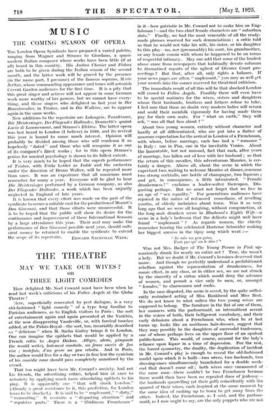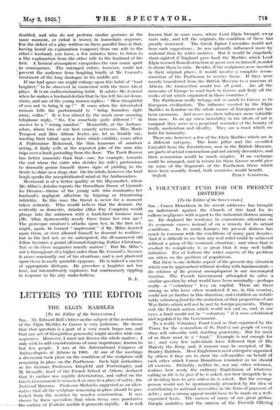THE THEATRE
MAY WE TAKE OUR WIVES ?
OR
THREE LIGHT COMEDIES
I-low delighted Mr. Noel Coward must have been when he read last week's criticisms of his Fallen Angels at the Globe Theatre !
Here, superficially renovated by pert dialogue, is a very old-fashioned " light comedy " of a type long familiar to Parisian audiences, as to English visitors to Paris : the sort of entertainment again and again presented at the Varietes, at the now disappearing Vaudeville, or, with farcical touches added, at the Palais-Royal—the sort, too, invariably described i.s " delicious " when M. Sacha Guitry brings it to London. One can imagine the epithets that would be applied by a French critic to Anges Dichus. - Alkgre; alerte, pimpante (he would write), lestement conduits, un franc succes de fon sire ; toutefois, d'un genre un peu rebattu- . And in Paris, the author would live for a day-or-two in fear lest the cynicism of his comedic rosse should pass completely unnoticed -by the crowd.
That too might have been Mr. Coward's anxiety, had not his friends, the advertising critic's, helped- him at once -to notoriety by applying much more stimulating epithets to his play. It is apparently one " that will shock London." (Already a great assistance to it, this prediction, for London loves to be shocked.) It is said to be " unpleasant," " dirty," " nauseating." It contains a " disgusting situation " and "-repulsive parts." There is a " libidinous Frenchman"
in it—how patriotic in Mr. Coward not to make him an Eng- lishman !—and the two chief female characters are " suburban sluts." Finally, we had the most venerable of all the ready- made phrases reserved for such denunciations : a critic told us that he would not take his wife, his sister, or his daughter to this play—no, nor (presumably) his aunt, his grandmother, or any female cousin with whom he happened to be on terms of respectful intimacy. May one add that some of the loudest abuse came from newspapers that habitually devote columns to dramatized reports of the ugliest of Divorce Court pro- ceedings ? But that, after all, only rights a balance. If your news pages are often " unpleasant," you may as well get your morals into the corner reserved for theatrical criticism.
The immediate result of all this will be that shocked London will crowd to Fallen Angels. Possibly there will even have to be special matinees for the wives, sisters and daughters whom their husbands, brothers and fathers refuse to take. I feel sure that these no doubt very modem ladies will return and scold their menfolk vigorously for having made them pay for their own seats. For " what on earth," they will ask, " was all that fuss about ? "
About two young women, entirely without character and hardly at all differentiated, who are put into a flutter of amorous expectation for the arrival in London of a Frenchman, with whom, before marriage, each has had a " romance " in Italy : one in Pisa, one in the inevitable Venice. About the lamentable, but not unusual, fact that each, after years of marriage, has fallen out of love with her husband ; so that the return of this cavalier, this adventurous Maurice, is cer- tainly a danger. Above all, about the scene in .which the expectant two, waiting to welcome Maurice at dinner, consume two strong cocktails, one bottle of champagne, two liqueurs ; and get, in consequence, a little intoxicated. " Female drunkenness ! " exclaims a leader-writer thereupon. Dis- gusting perhaps. But we must not forget that we live in an age of " sex equality." For generations audiences have rejoiced in the antics of red-nosed comedians, of revelling youths, of elderly inebriates about town. Was it so very long ago that we were all laughing, without compunction, at the long male drunken scene in Bluebeard's Eighth Wife—a scene in a lady's bedroom that the delicate might well have found " unpleasant " ? As regards women, the elderly remember hearing the celebrated Hortense Schneider making her biggest success in the tipsy song which went:
" Je suis un peu grim. Faut pas qu' on le disc ! "
Was not Mrs. Badger of The Young Person in Pink up- roariously drunk for nearly an entire act ? True, she wasn't a lady. But we doubt if Mr. Coward's heroines deserved that name. And though we perfectly understand a prohibitionist rebellion against the representation of drunkenness, for comic effect, in any class, or in either sex, we are not struck by the sincerity of a virtue which would deny the advance of women, and permit a vice only to men, or, amongst " females," to charwomen and cooks.
In the case disputed, the scene is saved, by the quite suffici- ently restrained acting of Miss Bankhead and - Miss Best. We do not know to what milieu the two young wives are supposed to belong. The furniture in the flat of one of them, her manners with the parlourmaid, an intermittent accent in the voices of both, their belligerent vocabulary, and their early delusions about a Frenchman who, when he at last turns up, looks like an assiduous hair-dresser, suggest that they may possibly be the daughters of successful tradesmen, one of whom perhaps lives on the upper floor of an opulent public-house. This would, of course, account for the lady's reliance- upon liquor in a time of depression. -For-the rest, the forced symmetry, the duality, the duplication of incident in Mr. Coward's play is enough. to reveal the old-fashioned model upon -which it is built—two wives, two husbands, two dressing-cases simultaneously brandished for a double week- end that doesn't come off ; both wives once enamoured of the same man—there coiddift be two Frenchmen because there would then have been no repeated duos of jealousy— the husbands quarrelling (at their golf) coincidently with the quarrel of their wives, each inspired at the same moment by the same idea of rushing up to town to get away from the other. Indeed, the Frenchman, as I said, and the parlour- maid, as I now ought to say, are the only puppets who arc not
doubled, and who do not perform similar gestures at the same moment, or (what is worse) in immediate sequence. For the defect of a play written on these parallel lines is that, having heard an explanation (suppose) from one wife to the
other's husband, you have, a few minutes later, to listen to a like explanation from the other wife to the husband of the first. A farcical atmosphere vanquishes the true comic spirit in consequence. The outraged Critics, however, could not prevent the audience from laughing loudly at Mr. Coward's treatment of the long duologue in his middle act.
If one had space one might enlarge upon this habit of "loud laughter," to be observed in connexion with the three latest -plays. It is an undiscriminating habit. It salutes Mr. Coward when he makes a husband declare that he has left his ear down- stairs, and one of the young women replies: " How thoughtful Of you not to bring it up ! " It roars when the intoxicated woman tells the parlourmaid to " bring Saunders right away, coffee." It is less stirred by the much more amusing telephone reply, " No, I'm somebody quite different ! " in answer to a " wrong number." Meanwhile, at the Ambass- adors, where two of our best comedy actresses, Miss Marie Tempest and Miss Athene Seyler, are, let us frankly say, wasting their talent upon a farce which exhibits, years after A Pantomime Rehearsal, the thin humours of amateur acting, it fairly yells at the repeated joke of the man who trips over a hook protuding from the floor. The Torch Bearers has better moments than that—one, for example, towards the end where the critic who derides his wife's pretensions to dramatic genius himself shows signs of yielding to the desire to shine as a stage star. On the whole, however, the loud laugh speaks the unsophisticated mind at the Ambassadors.
Merriment is of a better quality at the Haymarket, where Mr. Milne's Ariadne repeats the threadbare theme of Grounds for Divorce—theme of the young wife who reanimates her husband's negligent affection by feigning or threatening infidelity. In this case, the threat is never for a moment taken seriously. Who would believe that the demure, the evidently so domestic, Ariadne (Miss Fay Compton) would plunge into the unknown with a hard-faced business man (Mr. Allan Aynesworth) nearly three times her own age ? The grotesque creature's attacks upon her, in the first act, might, again, be termed " unpleasant " if Mr. Milne insisted upon them, or ever allowed himself to descend to realities : but in the last act, as we anticipated, the ill-mannered old fellow becomes a genial all-round-forgiving Father Christmas. Not so do these magnates usually mature ! But Mr. Milne's wit is throughout of a higher order than Mr. Coward's, because it arises constantly out of his situations, and is not plastered upon them in easily quotable epigram. He is indeed a master of appropriate dialogue. He provokes a laughter not too loud, not intermittently explosive, but continuously rippling in response to his airy make-believe.
R. J.











































 Previous page
Previous page